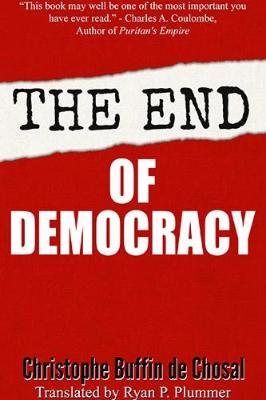

Most people would agree that democracy throughout the world is in deep trouble. From the polarizing politics of the United States to the endless refugee crisis in Europe to the rise in radical Islam, there is a widespread feeling that our way of life—political, cultural, and social—is under siege. But what if democracy itself is to blame? What if the current threats are not distortions of but inherent to democracy? What if the solution to our present ills is not “fixing” the system, but junking it entirely? Christophe Buffin de Chosal asks these forbidden questions, and answers them unarguably with Gallic wit and glittering style. If you read only one book on politics this year, let this be it! Foreword by Charles A. Coulombe.
Nothing is more dangerous to democracy than the people. That is why democracy will always claim to serve the people while only permitting a small number to rule in their stead. What democracy demands from the people is legitimacy. It does not care about their opinion.
The political parties put forward those of their members who show themselves to be the best manipulators. But among these, only those who are the most open to being manipulated themselves accede to power.
The ideal politician, on the other hand, is pliable, convincing, and a liar by instinct. He is not attached to any platform and has no ideological objective. The single thing to which he is truly committed is power. He wants its prestige and advantages, and seeks above all to be personally enriched by it. Any politician who presents this aspect is recognized as fit for power in a democracy.
Abstentionism lifts a corner of the veil. It is an important indicator. Far from being indifferent to election results, abstentionists consider it useless to vote, either because the candidate of their choice has no chance of winning or because, in their eyes, the country will be governed in the same way regardless of the winning candidate.
But when a party obtains an absolute majority, it can be tempted to put an end to the democratic system. Democracy is never protected from self-destruction. When the parties are too weak, it is the rule of the minority; when they are too powerful, they compromise the system. In both cases, democracy shows itself to be impossible.
The reality is that democracy was invented for the purpose of bringing an oligarchy into power and keeping it there.
Public sentiment ... has been conditioned so much against any other form of government and it has become so convinced that democracy, in spite of its weaknesses, is the system of humanity par excellence, that it cannot admit that this sure system could also be, like so many others, called into question.
It is striking to see how quickly a democratic population accepts as normal acts which it considered immoral, simply because they have become legal. Thus, wearing a safety belt inside a car has become a moral act because it is a legal obligation. Not insuring oneself when insurance is obligatory borders on immorality. Abortion and euthanasia, which revolted our grandparents, have become morally acceptable since being decriminalized. The salaries paid to political personnel, which constitutes an odious scandal in states claiming to be egalitarian, are generally accepted and at times even justified because they are legal.
Progress can only exist when we are convinced we can do better and that things can be perfected. How is it, then, we became convinced we could do no better than democracy?
:
Christophe Buffin de Chosal is a Belgian historian and a writer. He is married and the father of six children. He lives in Belgium. He has worked for 25 years as a high school and university teacher in the fields of History, Economics and Politics. His main fields of expertise are Medieval and Modern History, Modern and Contemporary Politics. Since 1988, he has written articles for Correspondance européenne, a French-speaking press agency based in Rome.Editorial Reviews
"This book may well be one of the most important you have ever read." - Charles Coulombe, author of Puritan's Empire.
"One cannot speak too highly of Christophe Buffin de Chosal’s The End of Democracy. In a fast paced, readable, yet scholarly fashion, Professor Buffin de Chosal demolishes the ideological justification in which modern democracy rests while he describes the disastrous effects that democratic rule has had on Western societies. He explodes the myth of Democracy as a protector of individual liberty, a prerequisite for economic progress, and a promoter of the higher arts. " -- AntoniusAquinas.com
